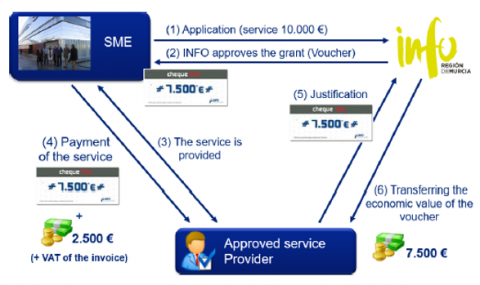Voucher Schemes – a great career since end of the 1990s

Vouchers are used as financial support instruments for businesses for more than 20 years. The innovation voucher concept started its career in Limburg, Netherlands in 1997. 10 years later at least 25 voucher schemes were on the 'market' in Europe; in 2018 the estimate was about 50 (Source: EURADA 2018). Voucher schemes develop not only in EU but also in other countries such as Canada, Singapore, Switzerland and USA.
In 2018, EURADA (European Association of Development Agencies) presented the results of a study on 'Europe's Innovation Voucher Schemes' carried out in the framework of the Interreg Europe ESSPO project. The study characterised voucher schemes as a 'simple and an effective instrument of regional and territorial development'. They are designed, implemented and deployed by public authorities on national, regional or local level 'to encourage certain behaviours, in this case innovation, in targeted companies – SMEs'.
In brief, voucher schemes are based on the following conditions:
- They support SMEs to purchase services from knowledge service providers;
- They have a fast and simple application process and reporting;
- They are issued by a local/ regional/ national agency by making a commitment to pay the service provider; and
- They are limited in scope and amount committed.
The figure below – based on a specific example – illustrates well the typical steps of a voucher scheme:

The principal steps of a voucher scheme (Source: EURADA 2018)
Beyond technology innovation, voucher schemes cover a variety of topics contributing to improve the competitiveness of SMEs. This variety is well illustrated in the Interreg Europe projects DEVISE, EIS, ESSPO, INTRA, PURE COSMOS, STOB regions and TRINNO: those vouchers cover topics such as digitalisation, internationalisation, business succession and e-commerce (see table below).
EURADA comes to the conclusion that 'the popularity of voucher schemes is found in its real added value of encouraging innovation for segments of a region’s SME population which are difficult to target for public intervention and for which traditional subsidies are not suitable due to a general lack of awareness.'
In summary, Vouchers - a really great career! which will most probably continue.
If you want hands-on-information on vouchers, please check the following table.
Vouchers in Interreg Europe projects - thematic objective SME competitiveness
| Topic | Vouchers | Projects |
|---|---|---|
| Innovation/technology | Technology Vouchers SMEs / News Understanding the need for upgrading SMEs digital skills to meet the innovation on technology future, the Region of Central Macedonia launches new actions for boosting and promoting entrepreneurship. Central Macedonia, Greece. Cross-Innovation Voucher / Good Practice Cross-innovation voucher scheme to help SMEs purchase R&D services to support the development of innovative products and processes. Vzhodna Slovenija, Slovenia |
Pure Cosmos INTRA |
| Digitalisation |
Digital Vouchers / Good Practice |
DEVISE ESSPO |
| Internationalisation | Voucher opportunities of internationalisation / Good Practice Simplified support for the 1st export. Includes an expert (certified) to help doing the diagnostic and initial prospection of external markets during 1 year. Alentejo, Portugal Document
The internationalisation vouchers, new policy measures for internationalisation of SMEs will be implemented from 2019 ti 2023 under the Operational Programme for the Implementation of the EU Cohesion Policy in the period 2014 - 2020. Vzhodna Slovenija, Slovenia |
EIS INTRA |
| E-commerce | Trading Online Voucher Scheme / Good Practice Trading online vouchers incentivise micro-enterprises to introduce online trading into their business model to better compete in a rapidly evolving marketplace. Eligible businesses can apply for a voucher up to €2,500 to cover 50% of costs. Ireland (Éire) See the Border Midland and Western Ireland good practice here. See the Southern and Eastern Ireland good practice here. |
TRINNO and EIS |
Further information is to be found here:
- EURADA 2018: Europe’s Innovation Voucher Schemes: What makes them successful and for whom? RSA Winter Conference, 16 November 2018
- JRC 2016: Incentivising Innovation and Adoption of ICT: ICT Innovation Voucher Programmes